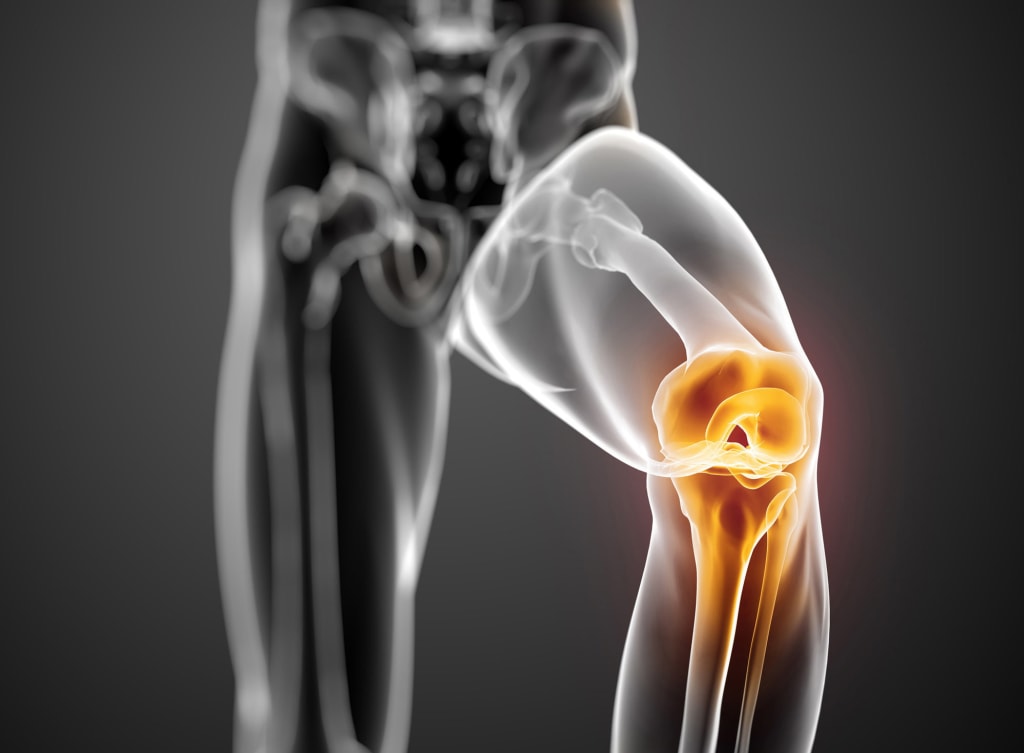The Importance of Knee Joint Health
Your Comprehensive Guide to Understanding, Preventing, and Treating Knee Joint Problems

The knee joint is a crucial component of our bodies, acting as the workhorse to support our movement. Understanding the health and wellbeing of our knees is essential to maintaining our overall fitness and quality of life.
Understanding the Knee Joint Anatomy
Key Components of the Knee
The knee is the largest joint in our body. It is a complex structure composed of bones (femur, tibia, and patella), cartilage, ligaments, and tendons. Together, these components facilitate movement and provide stability to our legs.
Role of the Knee Joint
The knee joint plays a pivotal role in most physical activities, from walking and running to bending and squatting. It absorbs shock from our movements and carries our body weight.
The Value of Maintaining Knee Health
Maintaining healthy knees is essential for mobility and independence, particularly as we age. A healthy knee joint helps us enjoy physical activities, pursue our hobbies, and live a life with less discomfort or pain.
Common Issues Impacting Knee Joint Health
Types of Knee Pain
Pain is often the first sign of a knee problem. This could manifest as a sharp, sudden pain or a dull, chronic ache. The location and nature of the pain can often help diagnose the underlying issue.
Symptoms of Unhealthy Knee Joints
In addition to pain, symptoms of unhealthy knee joints can include swelling, stiffness, redness, warmth, or a decreased range of motion. Sometimes, it might result in a “locking” of the knee or an unstable feeling, like your knee might give out.
Major Causes of Knee Joint Problems
Understanding the common causes of knee joint problems can be the first step towards taking appropriate action to manage or prevent these conditions. Below, we delve into the primary causes of knee joint issues.
Injury
One of the most common causes of knee joint problems is injury. Knee injuries can occur during various activities, including sports, outdoor activities, or even simple day-to-day tasks. They typically involve damage to the structures supporting the knee, such as the ligaments, tendons, menisci, or the bones themselves. Common knee injuries include ligament tears (like ACL or MCL tears), meniscal tears, and fractures. These injuries can lead to immediate pain, swelling, and difficulty in moving the knee, and if not properly treated, they can contribute to long-term knee joint problems.
Aging
Aging is another significant factor affecting knee health. As we grow older, the wear and tear on our knee joints increase, primarily due to the gradual wearing away of the cartilage that cushions our knees. The degeneration of this protective cushion can result in conditions such as osteoarthritis, a common form of arthritis where the cartilage in the knee joint gradually wears away. Osteoarthritis leads to pain, stiffness, and sometimes swelling in the knee, making it difficult to perform daily activities.
Lifestyle Factors
Certain lifestyle choices and habits can also contribute to knee joint problems. For instance, being overweight or obese significantly increases the strain on your knees, accelerating cartilage wear and tear and increasing the risk of osteoarthritis. A lack of physical activity can lead to weak muscles supporting the knee, which can also increase the risk of injuries and joint problems.
On the other hand, excessive or improper exercise can also pose risks. High-impact sports or activities that place excessive stress on the knee joint, such as long-distance running or certain types of weightlifting, can lead to overuse injuries like runner’s knee or jumper’s knee.
Further, poor diet and nutrition can affect bone and joint health, and habits like prolonged periods of sitting or standing can lead to stiffness and pain in the knee.
Medical Conditions
Certain medical conditions can lead to knee joint problems. For example, rheumatoid arthritis, an autoimmune disease, can affect multiple joints including the knees, causing pain, swelling, and potential deformity. Gout, a form of arthritis caused by excess uric acid in the bloodstream, can also affect the knee, causing intense pain and swelling. Other conditions like lupus or psoriatic arthritis can also cause knee pain and damage.
Genetic Factors
Genetics can also play a role in knee joint health. If your family has a history of knee problems or diseases like osteoarthritis or rheumatoid arthritis, you may be at a higher risk of developing these conditions.
In conclusion, knee joint problems can be caused by a variety of factors, from injury and aging to lifestyle choices and underlying medical conditions. By recognizing these causes, we can take proactive steps towards prevention and appropriate treatment. It’s always recommended to consult a healthcare professional if you experience persistent knee pain or other symptoms related to the knee joint.
Preventive Measures for Knee Health
Taking proactive measures to maintain knee health can help prevent knee joint problems and ensure mobility and quality of life. Here, we will delve into several effective preventive strategies.
Exercise
Regular exercise is one of the most effective ways to keep your knees healthy. It strengthens the muscles that support your knees, helping to stabilize and protect the joint.
Low-impact exercises like swimming, cycling, and walking are excellent choices as they provide a good workout without placing excessive stress on the knee. Resistance training, using light weights or resistance bands, can strengthen the quadriceps and hamstrings which are vital muscles for knee support.
Also, exercises that improve flexibility and balance, such as yoga and tai chi, can enhance joint function and prevent falls and injuries.
Maintain a Healthy Weight
Carrying extra body weight can put significant stress on your knee joints. Over time, this can lead to accelerated wear and tear and increase your risk of osteoarthritis. Maintaining a healthy weight through balanced nutrition and regular physical activity can reduce pressure on your knees, prevent inflammation, and contribute to overall joint health.
Follow a Balanced Diet
Eating a balanced diet can nourish your body with necessary nutrients for maintaining joint health. Foods rich in omega-3 fatty acids, such as fatty fish and flaxseeds, can help reduce inflammation. Calcium and vitamin D are essential for bone health, so include dairy products, fortified cereals, leafy greens, and sunlight exposure for vitamin D synthesis. Also, foods rich in antioxidants, such as fruits and vegetables, can help fight inflammation and protect joint health.
Wear Proper Footwear
The type of footwear you use can influence the stress on your knee joints. Shoes that don’t fit correctly or lack proper support can alter your gait, leading to increased stress on your knees. Opt for comfortable, supportive shoes, particularly when exercising. If necessary, custom orthotics may be recommended to provide additional support and correct any biomechanical issues.
Use Correct Techniques When Exercising or Lifting Heavy Objects
Using proper form and techniques when doing physical activities can prevent knee injuries. When exercising, ensure you’re performing movements correctly to avoid placing unnecessary strain on your knees. When lifting heavy objects, use your legs and hips rather than your back and knees.
Regular Check-ups
Regular health check-ups allow for early detection of potential issues that might affect your knee health. If you’re experiencing persistent knee pain or discomfort, it’s best to consult a healthcare professional. They can provide advice or treatments to address the problem before it worsens.
Knee Protection During Sports
If you play sports or engage in physical activities that place a lot of stress on your knees, consider using knee guards or braces for extra protection. Also, remember to warm up adequately before starting the activity and cool down afterward to keep your muscles and joints flexible and ready for movement.
Remember, the best way to handle knee joint problems is to prevent them from occurring in the first place. By following these measures, you can greatly improve your knee health and maintain your mobility and quality of life. Always consult with a healthcare professional or a physiotherapist for personalized advice based on your individual health and lifestyle factors.
Effective Treatments for Knee Joint Issues
When knee joint issues do occur, knowing the various treatment options can help you navigate towards relief and recovery. The treatment approach largely depends on the nature of the problem, its severity, and the patient’s overall health status. Below, we explore some common and effective treatments for knee joint issues.
Physical Therapy
Physical therapy can be an effective treatment for various knee joint problems, particularly those involving muscle weakness, imbalances, or post-injury rehabilitation. A physiotherapist can guide you through specific exercises designed to strengthen your knee and improve flexibility and range of motion. These exercises can help reduce pain, improve joint function, and prevent further knee problems.
Medications
Pain relievers and anti-inflammatory medications are often used to treat knee joint problems. Over-the-counter nonsteroidal anti-inflammatory drugs (NSAIDs), like ibuprofen, can help reduce pain and inflammation. For more severe pain, your doctor might prescribe stronger painkillers.
Additionally, certain medications are used to treat specific conditions. For instance, for rheumatoid arthritis, disease-modifying antirheumatic drugs (DMARDs) are used to slow the progression of the disease and preserve the joints.
Injections
In some cases, doctors may recommend injections directly into the knee joint. Corticosteroid injections can provide relief from inflammation and pain for several weeks to months. Another type of injection, hyaluronic acid, works by lubricating the knee joint, functioning like the natural fluid in your knee to ease joint movement.
Weight Management
For individuals who are overweight or obese, weight loss can significantly improve knee joint symptoms. Losing even a small amount of weight can reduce pressure on your knee joints and decrease pain. This can be achieved through a balanced diet and regular exercise.
Surgery
If conservative treatments aren’t effective, or if the knee joint damage is severe, surgery may be recommended. Several types of surgery can be performed depending on the specific issue:
Arthroscopic surgery: A minimally invasive procedure where small incisions are made, and a tiny camera (arthroscope) is used to diagnose and treat knee problems.
Partial knee replacement: Damaged parts of the knee joint are replaced with artificial parts.
Total knee replacement: The entire knee joint is replaced with an artificial joint.
Alternative Treatments
Some people find relief from knee pain through alternative treatments. Acupuncture, for instance, has been found to help some people manage their knee pain. Supplements like glucosamine and chondroitin may also provide some relief, although more research is needed to fully understand their effectiveness.
It’s essential to remember that treatment for knee joint issues is highly individual and should be guided by a healthcare professional’s advice. What works for one person might not work for another. Your doctor can help determine the best treatment approach based on your specific condition and overall health.
Now, if you’re ready to take the next step towards better knee health, don’t hesitate. Whether it’s integrating preventive measures into your lifestyle, exploring treatment options, or seeking professional medical advice, every step counts in the journey to improved knee health. After all, our knees play a crucial role in our mobility and quality of life – they deserve the best care we can give.
Conclusion
Knee joint health is undeniably crucial to our overall well-being and quality of life. Our knees bear much of our body weight and are key players in almost every movement we make. As such, paying close attention to knee health is not just a passing concern, but a lifelong investment.
Understanding the causes of knee joint problems – from injuries and aging to lifestyle factors and medical conditions – is the first step in preventing these issues. This knowledge empowers us to make informed decisions about our health and to take proactive steps towards maintaining robust knee health.
Taking preventive measures such as regular exercise, maintaining a healthy weight, consuming a balanced diet, and wearing suitable footwear can have an enormous impact on reducing the risk of knee joint issues. It’s essential to remember that prevention is better than cure, and the earlier we begin to take care of our knees, the longer they will continue to serve us well.
When knee joint issues do arise, the effective treatments range from physical therapy and medication to injections and even surgery. Each treatment has its unique role and can be effective depending on the specifics of the knee joint problem. Seeking timely medical advice is critical in managing these issues effectively.
However, treatment is just one part of the picture. The recovery process from knee joint issues often involves lifestyle modifications, such as improved diet and regular exercise. These not only help with recovery but also contribute to long-term knee health. Therefore, knee health is not merely a destination but a continuous journey that involves making consistent, healthy choices.
To navigate this journey, it’s crucial to stay informed, stay proactive, and prioritize knee health. We hope that this comprehensive guide serves as a useful tool on your journey towards understanding, preventing, and treating knee joint issues. With the right information and actions, you can ensure that your knees remain healthy and strong, carrying you forward in your life’s various adventures.
Keep in mind that your journey to knee health is unique. While this guide provides general advice and information, it’s always essential to consult healthcare professionals for personalized advice based on your individual health and lifestyle factors.
So, don’t wait! Take the first step today towards better knee health. Every step counts and brings you closer to a healthier, more mobile, and pain-free life.
FAQs
1. What exercises are good for knee health?
Low-impact exercises like swimming, cycling, and walking are great for knee health. Additionally, strength training, flexibility, and balance exercises, such as yoga and tai chi, can help improve joint function and prevent injuries.
2. How does diet affect knee health?
A balanced diet nourishes your body with essential nutrients for maintaining joint health. Foods rich in omega-3 fatty acids can reduce inflammation, while calcium and vitamin D are crucial for bone health. Additionally, maintaining a healthy weight can significantly reduce stress on your knees.
3. How can I prevent knee joint problems?
Preventive measures include regular exercise, maintaining a healthy weight, following a balanced diet, wearing proper footwear, using correct techniques when exercising or lifting heavy objects, and regular health check-ups.
4. What types of medications are used for knee joint problems?
Pain relievers, anti-inflammatory drugs, and specific medications for conditions like rheumatoid arthritis are commonly used. In some cases, corticosteroid or hyaluronic acid injections may be recommended.
5. When is surgery necessary for knee joint problems?
Surgery may be necessary when conservative treatments fail, or the knee joint damage is severe. The type of surgery will depend on the specific issue and could include arthroscopic surgery, partial knee replacement, or total knee replacement.
About the Creator
DAVID WILLIAMS
Your trusted guide in the world of product choices. Through expert analysis and thorough comparisons, I help you confidently navigate the product landscape. Join me to discover, compare, and review the latest in the market.






Comments
There are no comments for this story
Be the first to respond and start the conversation.